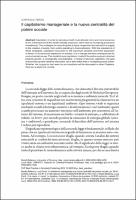Chapter Il capitalismo manageriale e la nuova centralità del potere sociale
| dc.contributor.author | Bellanca, Nicolò | |
| dc.contributor.author | Pardi, Luca | |
| dc.date.accessioned | 2022-06-01T12:16:48Z | |
| dc.date.available | 2022-06-01T12:16:48Z | |
| dc.date.issued | 2020 | |
| dc.identifier | ONIX_20220601_9788855181952_406 | |
| dc.identifier.issn | 2704-5919 | |
| dc.identifier.uri | https://library.oapen.org/handle/20.500.12657/56223 | |
| dc.description.abstract | Capitalism, in order to reproduce itself, must allocate more and more resources to the enhancement of the wealth already produced, rather than to increasing productive investments. The strategies for absorbing the surplus range from the reduction of supply to the creation of waste, from public spending to financialization. With the prevalence of these strategies, capitalism renounces to the maximum possible economic expansion in favour of its maximum expansion on society. It is a change that has consequences for environmental issues. The model of pure capitalism, in which the entire surplus is directed towards growth, is ecologically unsustainable. In today's historical capitalism, the goal of economic growth remains important, but it falls within that of increasing social power. Whether this is good or bad news for our biosphere will be discussed in other Chapters. Here we analyze the novelty. | |
| dc.language | Italian | |
| dc.relation.ispartofseries | Studi e saggi | |
| dc.subject.other | Economic surplus | |
| dc.subject.other | transnational capitalism | |
| dc.subject.other | managerial capitalism | |
| dc.subject.other | social power | |
| dc.subject.other | financialization | |
| dc.subject.other | economic growth | |
| dc.title | Chapter Il capitalismo manageriale e la nuova centralità del potere sociale | |
| dc.type | chapter | |
| oapen.identifier.doi | 10.36253/978-88-5518-195-2.08 | |
| oapen.relation.isPublishedBy | bf65d21a-78e5-4ba2-983a-dbfa90962870 | |
| oapen.relation.isbn | 9788855181952 | |
| oapen.series.number | 215 | |
| oapen.pages | 23 | |
| oapen.place.publication | Florence |

